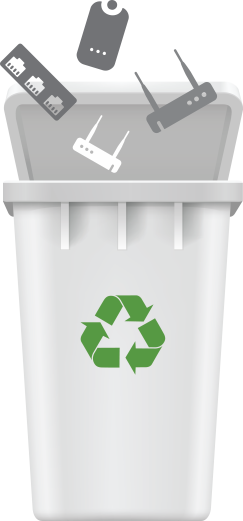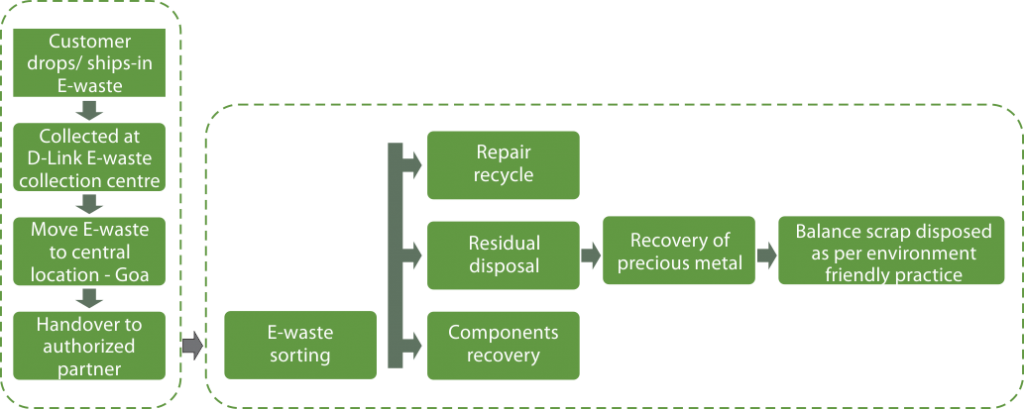Nurturning Nature
for a better future!



A long journey begins with a single step. Together, through small, individual steps, we can make a big difference to the environment. E-Waste management is a small step in the direction, in order to save the environment from the hazards of electronic, Battery and Plastic waste.
THREE EASY STEPS TOWARDS SAVING OUR NATURE

Scrap Collection
D-Link old/ obsolete products are collected at D-Link Authorized Scrap Collection Center

Scrap Collection
All old/ obsolete products are dismantled/ recycled through Govt. Authorized e-Waste Partner

Scrap Collection
Post segregation, the residuals are disposed as per environment friendly practices
Central Pollution Control Board Initiatives on E-Waste, Plastic Waste, and Battery Waste Management Guidelines and Implementation
Introduction
The Central Pollution Control Board (CPCB), under the Ministry of Environment, Forest and Climate Change (Mo EFCC), plays a pivotal role in the formulation and enforcement of environmental regulations in India. To address the growing concerns over hazardous waste, particularly e-waste, plastic waste, and battery waste, CPCB has issued comprehensive guidelines and implementation rules aimed at sustainable management and mitigation of pollution.
E-Waste Management Initiatives
The rapid technological advancements have led to a surge in electronic waste (e-waste), which contains hazardous substances harmful to health and the environment. CPCB, as the regulatory authority, implements the E-Waste (Management) Rules, 2016 (amended in 2018), which:
- Mandate producers, importers, and consumers to ensure environmentally sound management of e-waste.
- Introduce Extended Producer Responsibility (EPR) requiring producers to take back and recycle e-waste.
- Provide guidelines for collection centres, dismantlers, and recyclers to operate under proper environmental standards.
- Promote awareness programs and capacity building to improve e-waste collection and recycling.
OUR E-WASTE MANAGEMENT PROCESS

E-WASTE COLLECTION CENTERS
D-Link India has setup E-waste Collection points through it wide service network. Our service network comprises of D-Link Service Centers, D-Link Authorized Service Partners, Partner Courier Collection points and Customer Site. D-Link (India) Ltd. has 109 points of presence throughout India.
Customers who wish to dispose old/ obsolete D-Link products can contact our Toll free No# 1860 233 3999 Or send mail to helpdesk@in.dlink.com
Our customer can also directly drop obsolete/ scrap D-Link products at the nearest D-Link Authorized Collection center (DACC).
D-LINK (INDIA) LIMITED E-WASTE (MANAGEMENT AND
HANDLING) RULES, 2011 COMPLIANCE UPDATE
The objectives of the e-waste Rules is to put in place an effective mechanism to regulate the generation, collection, storage, transport, import, export, (environmentally sound) recycling, treatment and disposal of e-wastes thereby reducing to a minimum those destined for final disposal.
D-Link India complied principles of Extended Producer Responsibility(EPR) to collect End of Life products/Components, Not repairable Products, defective components and other E-waste generate during sale and Service process, the same is disposed and processed through authorized recycler.
D-Link India has partnered with AER Worldwide, E-waste recycler based at Chennai to comply with the new India E-Waste management and Handling Rules in collecting the E-waste and recycling in accordance with standard laid down by Central Pollution Control Board. AER Worldwide India has obtained authorizations from the appropriate governmental agency for their processing facilities.
D-Link Supports Electronic Waste Management & adherers to government guidelines.
Plastic Waste Management Guidelines content
Plastic waste has become a critical environmental issue due to its non-biodegradable nature and widespread use. CPCB enforces the Plastic Waste Management Rules, 2016 (amended in 2021), which:
- Prohibit the manufacture, sale, and use of certain single-use plastic items.
- Require producers, importers, and brand owners to implement Extended Producer Responsibility (EPR) for collection and recycling.
- Encourage segregation of plastic waste at source, and promote waste processing and recycling infrastructure.
- Facilitate monitoring and compliance through regular reporting and inspections.
Printing of information on plastic packaging as per PWM Rule
| (i) Company Name |
(ii) EPR Registration No |
(iii) Category of Plastic Packaging |
(iv) Thickness of Plastic packaging (in case of Cat-II) |
(v) Registration No. of Compostable/ Biodegradable Plastic (as per Rule 4th of PWM rules) (in case of Cat-IV /V) |
(vi) Option (1-4) chosen for Labelling (Details given at Note II-A (1-4) below) |
|---|---|---|---|---|---|
| D-Link (India) Ltd | IM-23-000-08-AAMCS0799M-23 | I | - | NA | Option No. 3 |
| D-Link (India) Ltd | IM-23-000-08-AAMCS0799M-23 | II | >60 microns | NA | Option No. 4 |
Battery Waste Management Rules
Battery waste contains toxic metals like lead, cadmium, and mercury, which pose serious environmental and health risks. CPCB administers the Battery Waste Management Rules, 2022, focusing on:
- Mandating producers to implement EPR by establishing collection channels for used batteries.
- Regulating collection, transportation, recycling, and disposal of battery waste to prevent environmental contamination.
- Setting standards for treatment and recycling facilities to ensure safe handling.
- Raising awareness among stakeholders on battery waste hazards and proper disposal methods.
Implementation and Enforcement
CPCB, in collaboration with State Pollution Control Boards (SPCBs) and Pollution Control Committees (PCCs), monitors compliance through:
- Regular inspections and audits of producers, recyclers, and waste handlers.
- Imposition of penalties and legal action for violations of waste management rules.
- Capacity building initiatives to train enforcement agencies and stakeholders.
- Public awareness campaigns to encourage responsible waste disposal and recycling.
Conclusion
The CPCB’s initiatives on e-waste, plastic waste, and battery waste management provide a regulatory framework aimed at minimizing environmental impact and promoting circular economy principles. Effective implementation of these guidelines and rules is critical to safeguarding public health and the environment, requiring active cooperation among producers, consumers, recyclers, and government agencies.
D-Link (India) Ltd is registered with the Central Pollution Control Board (CPCB), under the Ministry of Environment, Forest and Climate Change Certificates.
Registration No & Certificates.
E-Waste Registration Certificate Number: B-29016(3809) (EPR)/23/WM-III
Battery Waste Registration Certificate Number: CPCB/BWM/2174 Certificate No :23452174
Plastic Waste Registration Certificate IM-23-000-08-AAMCS0799M-23